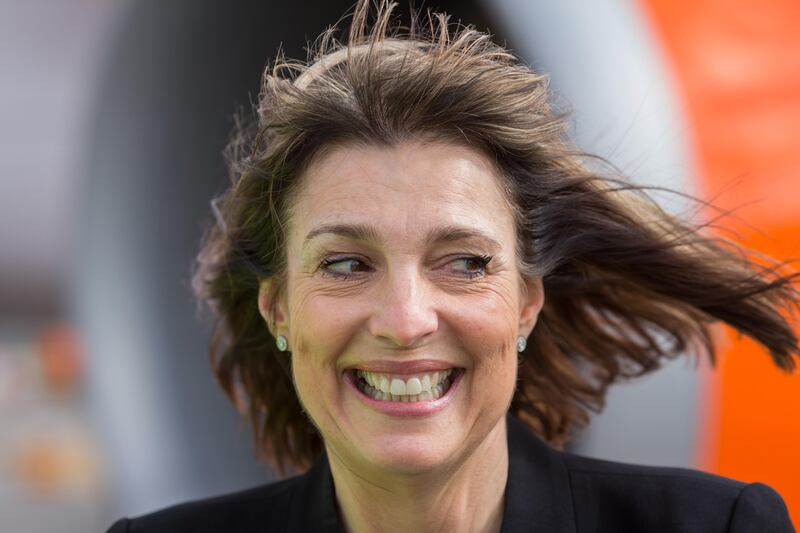Since she took over as the chief executive of easyJet in 2010, Carolyn McCall has been an outstanding success, steering the low-cost airline through an increasingly competitive and regulatory environment, growing its market share, opening up new routes and almost trebling its share price.
But she is an ambitious lady and after seven busy years in the job she is moving on, taking over as the head of ITV, the United Kingdom’s biggest commercial broadcaster. It is a bigger company and a bigger job – ITV has a market value of £7 billion (Dh33.58bn) against £5.6bn for easyJet – but it also has its bigger share of bigger problems. In May, the company warned investors to expect an 8 to 9 per cent decline in ad revenues in the first half of 2017 and last week the chief executive of Channel 4, David Abraham, said the UK ad market has already dipped into recession as advertisers cut back spending in the face of the political and economic uncertainty caused by Brexit.
However, Ms McCall is no stranger to problems or advertising recessions: she was the chief executive of Guardian Media which, through no fault of hers, has lost an average of £1 million a week for the past 10 years and shows no sign of slowing down. Fortunately, it still has a large pile of cash left over from the sale of its stake in Autotrader, the vehicle classifieds business, but nothing lasts forever. She started her career in the advertising department of the Independent newspaper which, alas, is no more at least in print form, another victim of collapsing ad revenues for traditional media the world over as Facebook and Google eat into the market.
Nor is she any stranger to Brexit-inspired problems. All the European airlines have been struggling in one way or another with the uncertainty caused by the British government’s chaotic approach to EU exit negotiations as well as terrorist attacks and a glut of airline capacity that has driven down fares. In May, Ms McCall announced that easyJet had plunged to its worst first-half loss for six years (£236m), partly as a result the fall in sterling, which cost it £82m.
But she is not the kind of person to let little things like Brexit get her down. When Britain voted "Leave", she immediately set out on a strategy to take advantage of the expected turmoil in the wider European airline industry, upgraded her orders with Airbus to bigger planes and established a new Vienna-based airline to minimise disruption and maintain flights within the continent after 2019. EU rules state that an airline must be based in Europe to fly across the continent and the establishment of "easyJet Europe" anticipates the possibility of the UK and EU failing to sign a deal that preserves all the benefits of the single aviation market.
When she embarked on that energetic strategy, she obviously expected to be there to implement it – the ITV job was not on the horizon then and, even if it was, there was no certainty she would be offered it. Or even want it. Its issues are of a completely different dimension. Under its previous chief executive Adam Crozier, who left in June after being in charge for seven years, ITV has been reducing its reliance on the advertising market by growing its production division. But it still has a long way to go and on Monday analysts were muttering darkly about her challenge to shore up ITV’s domestic dominance of UK TV advertising at the same time as growing new digital revenues, particularly from targeted online ads. The media research firm Enders solemnly warned that broadcast TV advertising, unlike print display, which has been falling in double digits for years, “may have looked immune to online until very recent times, but all that is starting to change”.
To less stout-hearted people than Ms McCall, reversing, or even slowing the fall, could look like an impossible task. She could not do it at The Guardian, which is said to be seriously considering abandoning its Monday to Friday print edition, and she will struggle to do it at ITV. It could also be said that, although she did well at easyJet, her great rival Ryanair did even better, with a five-fold increase in the share price against her three since 2010. And although she did well financially at easyJet, earning £6m to £7m a year in the peak times, Ryanair's chief Michael O'Leary handsomely topped her, recently selling 4 million shares at an all-time peak to net £63.5m.
But she will have a go – and will not be paid badly for trying. Mr Crozier earned £3.4m in 2016 and on Monday ITV announced that Ms McCall’s package would at least match that, and she would also receive compensation for giving up long-term share options at easyJet.
At The Guardian, where she rose through the ranks, she was known as a "very tough" operator – which she needed to be in the first few years of her tenure at easyJet as she and fought a pitched battle against the airline's cranky founder and biggest shareholder, Stelios Haji-Iaonnou, who complained that it had created no shareholder value for a decade.
The difference is that at easyJet she was operating in a growing market. ITV operates in a shrinking one.
But if anyone can bring it off, she can.






